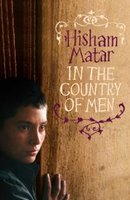 Naeem Murr has won the best book award for The Perfect Man, while the first book award has gone to Hisham Matar for In the Country of Men, which was shortlisted for the Booker Prize.
Naeem Murr has won the best book award for The Perfect Man, while the first book award has gone to Hisham Matar for In the Country of Men, which was shortlisted for the Booker Prize.Angela Smith, the chair of judges says that the titles of these two books:
... refer ironically to patriarchal ideals. ... Both novels are set in the recent past and question the models of what it means to be masculine that are offered to boys in different and sometimes overlapping cultures.The Perfect Man is about a 12-year-old Anglo-Indian boy who is abandoned to the care of relatives in London and then his father's mistress in a small American town, written by an author who knows what it it to live between cultures - Murr is of Lebanese and Irish parentage, was born in London and lives in the US. (Read more about him on his website.)
Hisham Matar's book, which I highly recommend, is set in Tripoli in the 1970's. The story is told through the eyes of Sulaiman a nine year old boy who struggles to make sense of what is going on around him after his father is arrested.
Hisham Matar was born in New York and spent his childhood in Tripoli and Cairo before moving back to Britain. He knows only too well the nightmare scanrio he is writing about - his father, a Libyan dissident living in Cairo - was kidnapped, taken back to Tripoli and imprisoned and tortured.
The results for Canada and the Caribbean have also been announced with two books by Canadians taking the prizes. The Friends of Meager Fortune by David Adams Richards won Best Book and Vandal Love by D.Y. Bechard, Best First Book.
The results for Africa and South-East Asia/South Pacific, will be announced next week.
The regional winners then enter the final stages of the prize which will be announced on May 27th.
